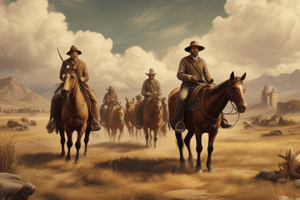Podcast
Questions and Answers
What was the time in which Americans made their way westward to find gold called?
What was the time in which Americans made their way westward to find gold called?
- Dawes Act
- Gold rushes and westward migration (correct)
- Homestead Act
- Sioux Uprising
Who created Mormonism?
Who created Mormonism?
Joseph Smith
What did the Homestead Act of 1862 promise?
What did the Homestead Act of 1862 promise?
160 acres of land to anyone who would work the land in the west for five years
What event involved Sioux tribesmen attacking settlements and a U.S. military detachment?
What event involved Sioux tribesmen attacking settlements and a U.S. military detachment?
What was the purpose of the Treaty of Fort Laramie?
What was the purpose of the Treaty of Fort Laramie?
What was the Sand Creek Massacre?
What was the Sand Creek Massacre?
What did the 'Peace Policy' aim to do?
What did the 'Peace Policy' aim to do?
What did the Dawes Act of 1887 authorize?
What did the Dawes Act of 1887 authorize?
What event at Wounded Knee resulted in significant loss of life?
What event at Wounded Knee resulted in significant loss of life?
Study Notes
Westward Expansion and Conflict
- The gold rushes sparked a massive westward migration as Americans sought fortune, significantly impacting the demographic landscape.
- The Homestead Act of 1862 offered 160 acres to individuals willing to cultivate the land for five years, encouraging settlement in the western territories.
Key Figures in the Westward Movement
- Joseph Smith founded Mormonism, contributing to the religious and cultural diversity of the westward movement.
Native American Resistance and Government Policies
- The Sioux Uprising saw tribesmen attacking settlements and ambushing US military forces, reflecting rising tensions.
- The Treaty of Fort Laramie aimed to maintain peace by establishing the Black Hills reservation for the Sioux, demonstrating attempts at diplomacy.
- The Sand Creek Massacre was a tragic event where US forces killed a significant number of Native Americans, highlighting the violent conflicts during this era.
Government Approaches to Indigenous Peoples
- The "Peace Policy" instituted by President Grant sought to replace corrupt Indian agents with Christian missionaries, indicating a shift towards moral governance.
- The Dawes Act of 1887 allowed the President to allot tribal lands for individual ownership, aiming to assimilate Native Americans into American society.
Tragic Climax of Conflict
- The Wounded Knee Massacre in 1890 resulted in the deaths of approximately 300 Sioux individuals, marking a fatal climax in the struggles between Native Americans and the US government.
Studying That Suits You
Use AI to generate personalized quizzes and flashcards to suit your learning preferences.
Description
Explore significant events and figures from Chapter 17 of The American Yawp. This quiz includes key terms such as the Gold Rush, the establishment of Mormonism, and the Homestead Act of 1862. Test your knowledge and deepen your understanding of westward migration in America.




